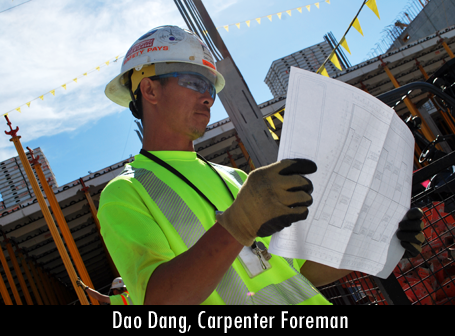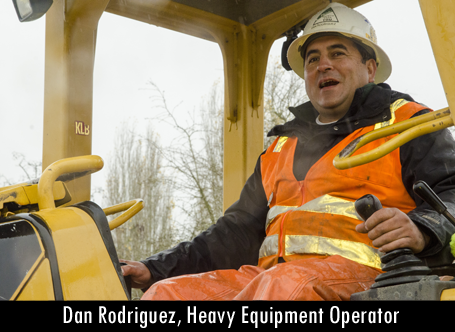Uncategorized
Dao Dang: Building a life in this country by building skyscrapers
To see Dao Dang today, striding around the Building Module 2 Intel site, coordinating a team of carpenters for his longtime employers Hoffman Construction, you would never guess that the man moved here from Central Vietnam at age 18 not knowing a word of English. But once you do have an idea of what it took for him to get to where he is today, Dang’s leadership role on his worksite seems even more admirable.
After Dang moved to Oregon with his father and brother, he took a janitorial job at the Oregon Zoo. After 3 months, he enrolled in a Job Corps carpentry program and learned both English and carpentry at Timer Lake Job Corps Center.
He spent his time alternating between one week of educational program offerings, one week learning vocational skills. He was attracted to working with wood and had done similar jobs during his youth in Vietnam, where one of the first places he worked was with his grandmother in the family’s malt grain business.
His most pronounced memory from those early days in this country? “You see a lot of high-rise buildings here,” he tells us. Perhaps it’s no coincidence that today, Dang plays a vital role in making those structures soar.
At 21, Dang followed his interest in carpentry into an official apprenticeship program. “My first reason was money,” the 39 year old tells us. “The next was that I really like the job.” His apprenticeship took him to various companies, and finally at Van Lom Concrete he became a journey-level Carpenter.
Six years after he started his apprenticeship, Dang arrived at Hoffman Structures. “They treat you nice here,” he says. “They provide you all the materials you want. And safety is number one for them.” In another six years he had become a foreman. “I had been there long enough,” he explains when we ask him what his company’s motivation behind promoting him was. “They thought that I knew everything I needed to know.”
Now that he’s a jobsite leader, Dang has gotten used to the duties of being a foreman. “I like being able to show people how to do things, to help.” His paycheck is now substantial enough to support his family: his wife of seven years Mong Chinh and their two sons.
The only drawback of his success may be how much time he finds himself investing on a mental level. “On a job site, you start stressing a lot. You go home to your wife and kids and it can be hard to focus on family life.”
Though he rarely works with other Vietnamese people on the job, Dang says he’s never been challenged in the workplace on the basis of ethnicity. He would, however, like to see more Vietnamese in the building trades, and ventures that there could be more resources for those who were looking at entering the industry.
“Find the trade you like and take the opportunity,” he counsels those looking for the same kind of success that he’s found in his career. The hard work is worth it. “My life would be more difficult if I wasn’t doing this. You make a better living in the trades.”
Dan Rodriguez: A heavy equipment operator who lives lightly
Dan Rodriguez says he’s pretty happy having spent the past 23 years being, as he likes to call it, “a dirt hand.” After meeting the guy, you tend to believe him – he’s led quite a life mastering the art of operating heavy equipment.
The expert dozer and scraper operator has his father to thank for his well-suited career – his dad suggested Rodriguez sign up with Local 701 Operating Engineer Union for heavy equipment operator training decades ago, after Rodriguez had spent his first five post-high school years indoors at a machinist shop.
“I learned I actually liked the smell of diesel engines and working with dirt,” the Klamath Falls native tells us.
Young Rodriguez moved to Eugene for his first trainings with Operating Engineers Local 701 – the first journey in a career that would bring a lot of traveling for the small town boy. A short time later, he wound up moving again. This time, it was to Boardman, Oregon, where he completed his pre-apprenticeship training. At the time, Rodriguez was working as an oiler. (It was several years before he “got into the seat.”)
Those first few days in Boardman, Rodriguez realized that education would be an ongoing process in this line of work. “They put me on a job where I was responsible for maintaining and greasing the plant and the equipment,” he says. “I had to figure out so much that at first, it took me 19 hours to get it all done. But I stuck with it, and later I was able to complete all the work in six hours.”
After putting in time as a crane oiler at Bonneville Dam, Rodriguez went to work for Kiewit Construction, where he spent 15 years. It took him six or seven years to complete his apprenticeship there, but he didn’t mind – the important thing was that he was staying busy. Three mentors took him under their wing and made sure he was consistently employed and accumulating new experience. They kept moving him from job to job and place to place, picking up new skills as he went along.
Those kinds of valuable connections with coworkers, Rodriguez learned, meant a lot when jobs lead to days and weeks away from home, staying in temporary living arrangements that afford you moments to really connect with your fellow workers.
“We get to talking, and, of course, we can’t help it,” Rodriguez reflects on these off-the-clock moments. “Pretty soon, we’re talking about this or that about our jobs. That’s been a great way to learn.” His work has led him to bunk down in a Lakeview, Oregon “man camp”, his own motor home for many years, in Astoria, and eventually, in Hawaii for a lifechanging three-year stint.
There’s something to be said for island living. “In Hawaii, I really learned a lot about working with people from many different cultures,” says Rodriguez. “It was a real adjustment getting used to the pace of work and life there.” He learned that he could “chill out a little” and still get his work accomplished, sans stress.
During his career, Rodriguez has moved from oiler to operator to crew chief to foreman – he’ll take the lead job when it’s requested — but he prefers “being in the seat.” “There is more to life than just working all the time,” says a man who prefers to spend his off hours with his girlfriend and her child over worrying about his career.
“Travel is a part of the life,” Rodriguez likes to say. His ability to adapt to new ways of doing things continues to serve him well in his professional life. “Each company has a different culture, too” he says. “For instance, one place really put a high value on keeping the equipment and vehicles clean and maintained. But at another outfit, they didn’t expect you to spend your time on much of that. They just assumed you’d be pretty rough on the equipment if you were really getting out there and working hard on your job.”
There is one consistent priority — safety. “You learn about safety every day,” he says. “Especially when people are operating big machines alongside of you, right next to your feet.” Rodriguez should know – he’s logged 25,000 workplace hours without an accident, advising new workers to be cautious because it can be easy to misjudge hazards when operating heavy equipment.
Advice to new workers from an old dirt hand? “Help others and along the way, never forget where you came from – that you were new once and everybody is always learning something.” Rodriguez adds his bottom line with a smile: “do the best job you can, but it’s okay to chill out a little too.”

